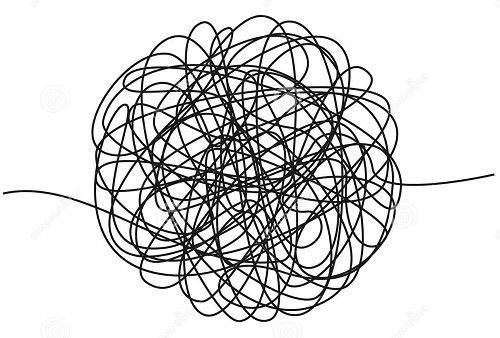FWP:
SETS == MAGAR
SPEAKING: {14,4}
The commentators treat the verse as a kind of parody of a classic children's game-- 'Guess what's in my hand!'. As they point out, the idea is that even when already prompted in the first line, the beloved is so radically indifferent to the sar-e rishtah-e vafaa that she still can't guess the answer.
That works, but I think there's more going on as well. Though it's more complex than the average mushairah-verse, this verse too has a deceptive, misleading first line that the listener must then radically reinterpret when-- in oral performance, after a suitably suspenseful delay-- the second line is finally vouchsafed.
The first line invites us to abstractness and conventionality. The word sar has such a variety of abstract meanings (see the definition above) that we really hardly know where to go with it. Then the same is true of the word rishtah , which in normal usage more often means 'relationship' than 'string'. When we come to vafaa , we easily move to an abstract meaning, because the beloved's heedlessness of a 'relationship of faithfulness' is so much more plausible than her heedlessness of a 'string of faithfulness'. We can now see that the lover is berating the beloved for her faithlessness, and we're prepared for some further elaboration of the usual complaints or laments in the second line.
Thus the first part of the second line comes as a kind of abrupt shock of incomprehensibility. Have we blundered into a different verse entirely, and is this a children's game? Not until the very end of the second line, and even perhaps for a few moments afterwards while our minds race to put it all together, do we 'get' what's going on. Now suddenly we have the unfolding enjoyment of all the layers: it's a child's game, it's a taunt, and it's a complaint.
In addition, it also has the sneakily clever quality noted by the commentators, that the beloved has already been told the answer-- though, like us, she probably misunderstood it as abstract (something about a 'relationship') rather than concrete (something about a 'string'). Or of course she might not have been paying attention at all, which is always a major risk when the lover is reproaching the beloved. So has he 'got' her, with his wit and his cute but sharp-edged childish taunt? Or has she 'got' him, since she's so indifferent she hasn't even bothered to listen to all that barbed wit?
There's one further enjoyable feature of this spectacular
verse. Different verses in this ghazal play with the refrain,
turning on and off its idiomatic and literal meanings at will. This verse
provides a new wrinkle: while {201,3} turns the
whole refrain into a single phrase of completely unidiomatic semantic 'normalcy',
this verse turns the refrain into two separate bits of such 'normalcy': the
kyaa becomes part of the phrase hai
kyaa , or 'what is it?' (with the 'it' colloquially omitted), while the
kahiye is left alone to mean 'please say'.

Nazm:
This verse's style of construction is new, and its theme too is fresh. The freshness of its theme is that sar-e rishtah-e vafaa is assumed to be a physical thing: he asks the beloved, 'Tell us what is in our fist'; and the inventiveness of the construction is that he's asked what's in the fist, but has also named the thing that's in the fist-- that is, 'There's something in our hand, but what is it? Tell us, since you have no thought for the sar-e rishtah-e vafaa '. (225)
== Nazm page 225